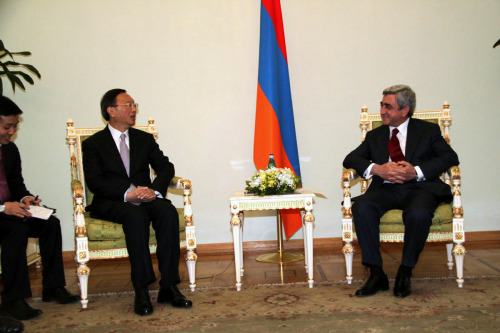Chinese FM due in Seoul for talks on N. Korea, bilateral relations
By 배현정Published : Feb. 23, 2011 - 10:22
Chinese Foreign Minister Yang Jiechi was due in Seoul on Wednesday for talks on North Korea and bilateral relations as the two countries differ over how to cope with Pyongyang's new nuclear program based on enriched uranium.
Yang's two-day visit coincides with a U.N. Security Council meeting, set for Wednesday in New York, which is expected to debate over whether to adopt an experts' report that the North's uranium program constitutes a violation of U.N. resolutions.
Yang's two-day visit coincides with a U.N. Security Council meeting, set for Wednesday in New York, which is expected to debate over whether to adopt an experts' report that the North's uranium program constitutes a violation of U.N. resolutions.

South Korea, the United States and other like-minded nations want to endorse the report, but China is against it over concern that it could aggravate tensions. Beijing insists that the North's nuclear program should be discussed at six-party talks.
The report, in the unlikely outcome that it is adopted, would represent the international community's first official recognition of the illicit nature of the uranium program that the North claims is for peaceful purposes despite widespread belief that it is part of Pyongyang's nuclear weapons ambitions.
The issue is expected to be one of the top agenda items for Yang's talks with South Korean Foreign Minister Kim Sung-hwan set for later Wednesday. Yang is also scheduled to pay a visit to President Lee Myung-bak later in the day.
North Korea revealed in November that it was running a uranium enrichment facility, adding to international concerns about its nuclear capabilities. Uranium, if highly enriched, can be used to make weapons, prodiving Pyongyang with a second way of building atomic bombs after its existing plutonium-based program.
Pyongyang says the purpose of the facility is to produce fuel for a power-generating nuclear reactor and that the country has the right to peaceful use of nuclear energy. But few believe the claim by a regime that has pursued nuclear ambitions for decades and conducted nuclear tests twice.\
South Korea and the U.S. have called for a tougher international response to the North's uranium program, including taking the case to the Security Council, saying the move violates U.N. resolutions banning the communist regime from nuclear activity.
Other issues on the agenda for Yang's talks with Kim include boosting bilateral ties.
Seoul and Beijing established diplomatic relations in 1992. Since then, the two countries have made strides in their economic and trade relations, with China overtaking the U.S. as South Korea's No. 1 trade partner.
But their political and security relations have not moved forward enough to match the flourishing economic ties, with China still seen as reluctant to exercise its influence to rein in the provocative regime in Pyongyang.
Seoul has tried to strengthen diplomacy toward China as it apparently feels limits in its ability to cope with the important neighbor that is becoming more assertive in regional and global issues in tandem with its rising economic influence.
(Yonhap News)








![[Today’s K-pop] BTS pop-up event to come to Seoul](http://res.heraldm.com/phpwas/restmb_idxmake.php?idx=644&simg=/content/image/2024/04/17/20240417050734_0.jpg&u=)
![[Graphic News] More Koreans say they plan long-distance trips this year](http://res.heraldm.com/phpwas/restmb_idxmake.php?idx=644&simg=/content/image/2024/04/17/20240417050828_0.gif&u=)






![[KH Explains] Hyundai's full hybrid edge to pay off amid slow transition to pure EVs](http://res.heraldm.com/phpwas/restmb_idxmake.php?idx=652&simg=/content/image/2024/04/18/20240418050645_0.jpg&u=20240419100350)

